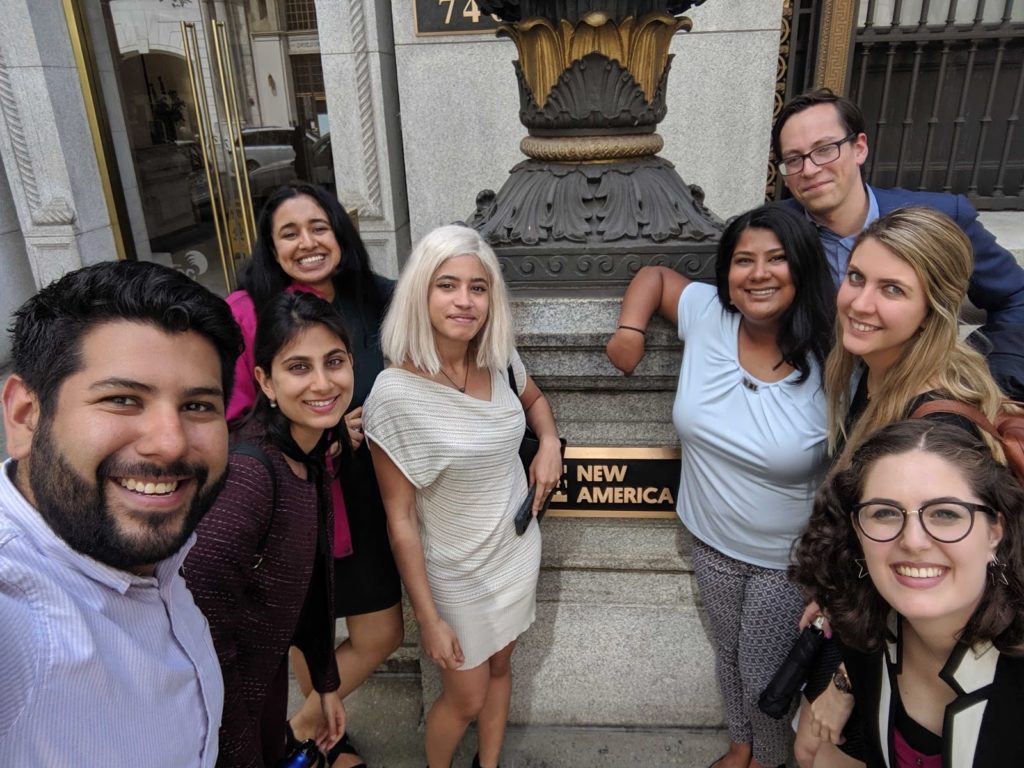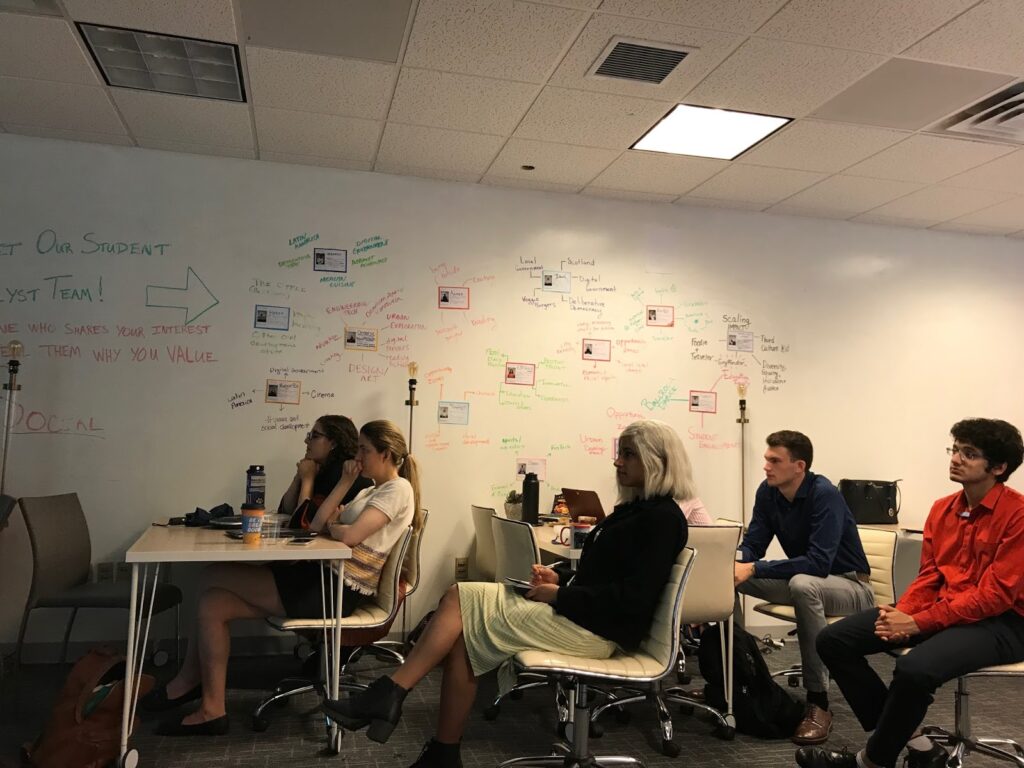Building Skills on Data Governance and Digital Service Delivery
Data + Digital Student Analysts | June 2019
It has been a busy first month for the six student analysts supporting the growing Data + Digital Portfolio at the Beeck Center. They’ve truly hit the ground running — from attending coding meetups to discussing data privacy for an upcoming PBS special to learning how to facilitate human-centered design workshops.
The Beeck Center’s Data + Digital work includes supporting efforts in the public and private sectors to responsibly share and use data to address some of society’s most challenging issues, as well as creating tangible resources and cultivating the community for government digital service leaders to help them share and scale efforts. As newcomers, our student analysts are learning about what it means to work in the fields of civic tech and digital service design while simultaneously supporting the team’s ongoing projects. And as students who are already thinking about their own professional futures, they’ve taken the time to explore the diverse range of pathways they can take into government innovation work in the future — including through efforts led by our colleagues in the Georgetown Tech & Society Initiative and the Public Interest Technology University Network.
We hope you’ll read on for some of their takeaways for the month of June.
—Vandhana Ravi, Data + Digital Program Associate

Learning while doing: Beeck Center as a training ground
The Data + Digital Student Analyst team had our work cut out for us when we first arrived at the Beeck Center earlier this summer. We are a group of students representing a number of different universities and backgrounds — from Rhode Island to Chicago, from chemical engineering to public policy — united by our shared interest in using data and technology to make government work better for the people it serves. In our first month, we have worked together to advance the work of the Beeck Center while also developing our own understanding of the major themes within the government Data + Digital space.
Community Building
One of the major themes we’ve encountered is the importance of building a community of practice, of professionalizing and creating clearer access points to this type of work in order to inject new energy into it. We have seen that systematically recruiting, training, and supporting young technologists represents a major challenge that government agencies at all levels are looking to address.
Thankfully, there are currently a myriad of different programs and initiatives to provide training opportunities and create a community of practice to help orient newcomers. We had the opportunity to learn about two such efforts early on, including BetaNYC’s Civic Innovation Fellowship and the Coding it Forward Fellowship. Both of these programs have taken on the task of training students in a variety of data, technology, and design skills, giving them exposure to professional experience in various levels of government, and creating networks for them to share their experiences and meet other like-minded practitioners. During a roundtable conversation with former U.S. Chief Data Scientist DJ Patil, we further explored the many opportunities and challenges that data scientists and engineers can expect to face when they enter the field of public service and how we can continue to build a support system for newcomers to the field.
We are a group of students representing a number of different universities and backgrounds — from Rhode Island to Chicago, from chemical engineering to public policy — united by our shared interest in using data and technology to make government work better for the people it serves.
Aside from the importance of support and training for students and others who are early in their careers and interested in government reform work, we have also been thinking a lot about how to improve communication between the policy wonks and technologists who often have to work together to accomplish civic tech projects. For this reason, some of our student analysts have been attending and participating in Code for DC brigade meetups to get a better understanding of what communication barriers might exist between parties with diverse professional backgrounds, but shared goals.
Storytelling
Another major theme we have encountered is one that is directly related to the Digital Service Collaborative’s goal of documenting and spreading the work of digital service leaders. Sarah Sullivan, the former Chief of Staff for the United States Digital Service (USDS), emphasized the importance of storytelling at an event hosted by the Public Interest Technology team at New America. Sullivan drew on her personal experiences in the USDS and the Massachusetts State Senate to explain how creating a storytelling culture within organizations is key to promoting truth telling. While she acknowledged that telling the truth and standing up to authority — whether to the public or even just internally in government — can be really challenging, she asserted its importance for those in the business of fixing government. We have also been exposed to story-telling as a powerful tool for helping governments serve the public. At the same event, Aaron Foley, the Chief Storyteller for the City of Detroit, spoke about local news coverage and the role it plays in mitigating feelings of alienation that some residents experience as a result of psychological gentrification.
We have seen that systematically recruiting, training, and supporting young technologists represents a major challenge that government agencies at all levels are looking to address.
In taking on the challenge of documenting the work of the civic tech sector, we have acknowledged the importance of learning what stories have already been told, what resources exist but might be hard to find, and finding new ways to disseminate existing information. To support this, we are working with Code for America to capture and centralize existing informational resources for civic technologists and government service delivery teams across the country.
Data, Ethics and Privacy
As the concepts of digital government and civic tech become more well understood, some of the most pressing questions we will have to confront are about data privacy and the ethical use of technology. We delved deeper into the subject during a conversation with Beeck Center Fellow Natalie Evans Harris as part of a PBS series that highlights the accomplishments of women in STEM — science, technology, engineering, and math — fields. Natalie, whose research focuses on the responsible use of data, guided us through a conversation about the privacy implications that should be considered when users give companies access to their data in exchange for a service. Our understanding of data ethics was pressed further during DJ Patil’s conversation when he introduced us to the topic of ethical data management and use as well as the new concept of a code of ethics for data scientists.
As the concepts of digital government and civic tech become more well understood, some of the most pressing questions we will have to confront are about data privacy and the ethical use of technology.
To further our knowledge on ethical data use practices, we attended a Deceptive Design and Dark Patterns Capitol Hill briefing. This panel addressed the Deceptive Experience to Online Users Reduction (DETOUR) Act, a piece of bipartisan legislation that protects users from relinquishing their data on online platforms due to deceptive user interfaces, or “dark patterns.” This was a particularly illuminating event given our team’s previous feelings of discomfort about the prevalence of deceptive data practices during our conversation with Natalie.
Given our concerns, we took the opportunity to hear different stakeholder viewpoints regarding data privacy legislation during an expert panel held on Information-Sharing Ecosystems at Brookings. During the debate, it became clear that many companies want some form of regulation but significant tensions exist on the best approach. We’re particularly interested in this debate between the proposal to allow consumers to own and monetize their data and the ability to more tightly control its collection.
Moving forward, we aim to continue to spread awareness about the implications of data collection and look forward to learning how to tackle these ethical hangups.

Human-Centered Design
In order to effectively tackle the incredibly nebulous and complicated problems we’ve been exposed to in the world of civic technology, we’ve sought out training in the principles of human-centered design. Many of us arrived at the Beeck Center having already been exposed to design principles, however, to sharpen our skills, we participated in a workshop led by Beeck Center Fellow Emily Tavoulareas where we learned the tools for designing workshops and applying problem scoping, ideation, and iteration to our own work processes.
We also had the opportunity to see a human-centered design workshop in action by attending a policy prototyping workshop hosted by the Harvard Kennedy School, Stanford Cyber Initiative and IDEO CoLab, focused on the future of work, including how automation will affect jobs and how we can make these inevitable job transitions equitable. We worked in breakout groups to design prototypes of products to address different aspects of emerging problems, such as the scarcity of high-quality jobs. The diverse backgrounds of the group, which included civic leaders, government professionals, academics, librarians, and industry representatives, helped bring different perspectives to the prototypes, and we left with a better understanding of the problems and tangible next steps for solutions.
International Perspectives
Finally, our team has been particularly interested in harnessing international perspectives in order to place the U.S. civic tech movement into a larger context. Members of the team have been hard at work designing a case study framework to create detailed accounts of innovation and digitization efforts in different Latin American governments. These case studies are meant to serve as learning tools both in the realm of academia and for practitioner usage. We hope to help key decision-makers expand their frames of reference as they design and draft digital transformation strategies for their own governments.
As part of the Beeck Center’s mission to support the civic tech community and assist in the delivery of better digital services, we, as Data + Digital student analysts, have been working hard to understand the existing ecosystem in order to better understand the most pressing questions and challenges involved in using data and technology to improve public services.
By listening to diverse voices in the sector and creating tools to build better government, our team is cultivating the community of digital service leaders and introducing new perspectives into the debate about the future of government work.
Student Analysts on the Beeck Center Data + Digital team who contributed to this piece include Margarita Arguello, Kell Crowley, Jillian Gilburne, Alberto Rodriguez Alvarez, Robert Roussel, and Dennese Salazar.